Key takeaways:
- Literary agents act as vital intermediaries between authors and publishers, providing market knowledge and connections essential for a writer’s success.
- Agents offer invaluable guidance during the writing process and help negotiate contracts, ensuring authors are compensated fairly.
- Finding the right agent involves evaluating their communication style and understanding, creating a collaborative partnership that enhances the author’s work.
- Resilience and openness to feedback are crucial for growth as a writer, as interactions with agents can provide valuable insights and motivation.
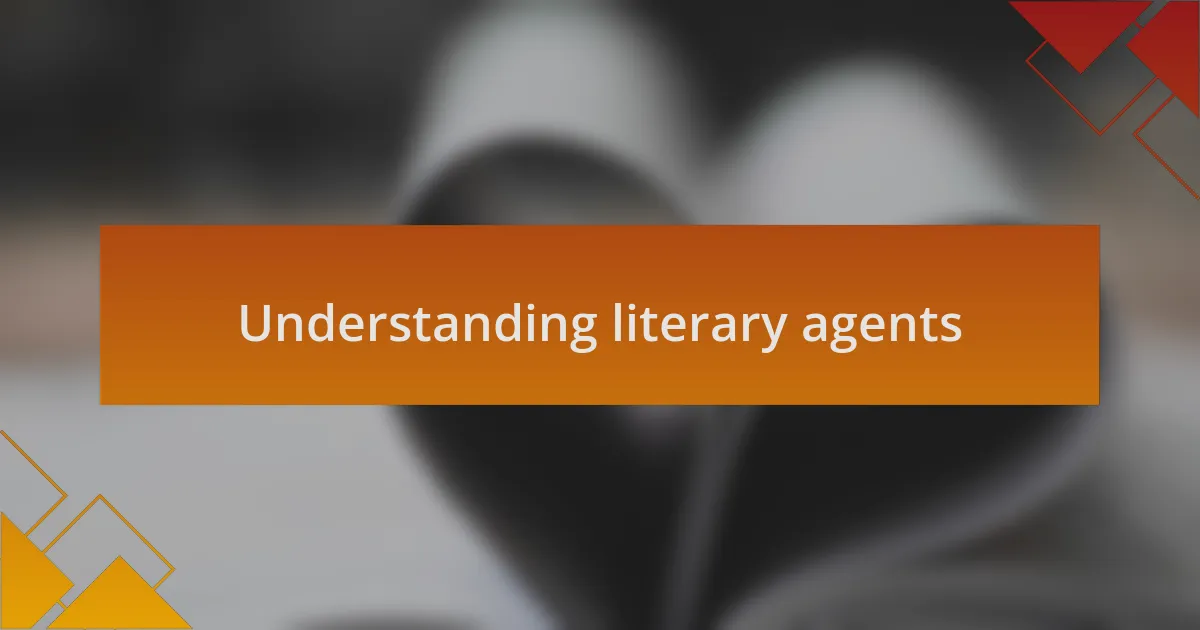
Understanding literary agents
Literary agents play a crucial role in the publishing industry, acting as intermediaries between authors and publishers. I remember the first time I considered working with a literary agent; it felt like stepping into a whole new world. They possess not only the knowledge of the marketplace but also the connections that can truly elevate a writer’s career.
When I think of literary agents, I often ponder how they sift through countless submissions to find that one gem. It’s fascinating to consider the skill set they hone over time, understanding market trends and reader preferences. I once spoke to an agent who mentioned that they can usually tell within the first few pages if a manuscript has potential – that kind of insight is invaluable to both authors and publishers alike.
Moreover, the relationship between an author and an agent is fundamentally collaborative. I vividly recall feeling both excited and nervous when I finally made contact with an agent who believed in my work. It was more than just business; it was about sharing a vision and journeying together toward publication. Have you ever considered how a literary agent could amplify your own voice in the bustling world of independent publishing?
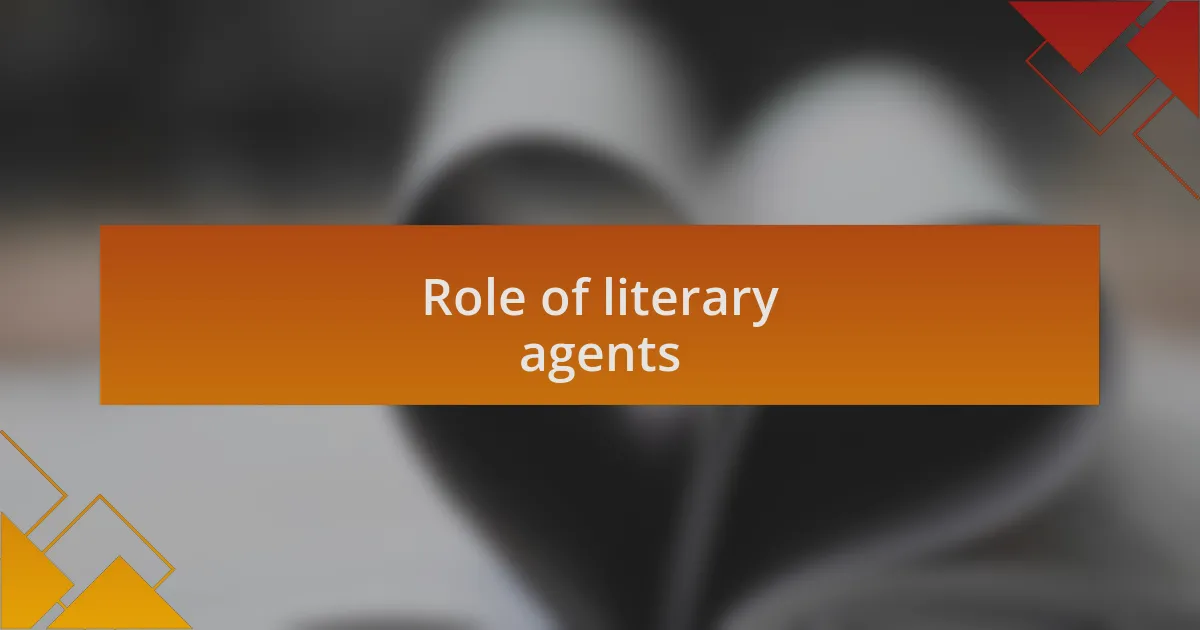
Role of literary agents
Literary agents serve as gatekeepers, expertly navigating the intricate world of publishing to connect authors with the right publishers. I recall attending a writers’ conference where an agent explained that their role is not just about selling a manuscript but also about finding the perfect fit for an author’s vision. Have you ever considered how this delicate matchmaking process can profoundly affect an author’s journey?
One essential aspect of a literary agent’s job is negotiating contracts on behalf of their clients. This can feel intimidating for many authors, especially when navigating the legalese. I remember feeling incredibly relieved when my agent stepped in during my contract negotiations; it was as if a huge weight had been lifted off my shoulders. The expertise they bring ensures that authors are fairly compensated and protected, which is crucial in an industry that can sometimes feel overwhelming.
Additionally, agents offer valuable guidance throughout the writing process. I can’t stress enough how transformative feedback from my agent was while drafting my second book. Their insights not only shaped my manuscript but also bolstered my confidence as a writer. Have you thought about the ways in which an agent’s perspective can refine your work and expand your creative horizons?
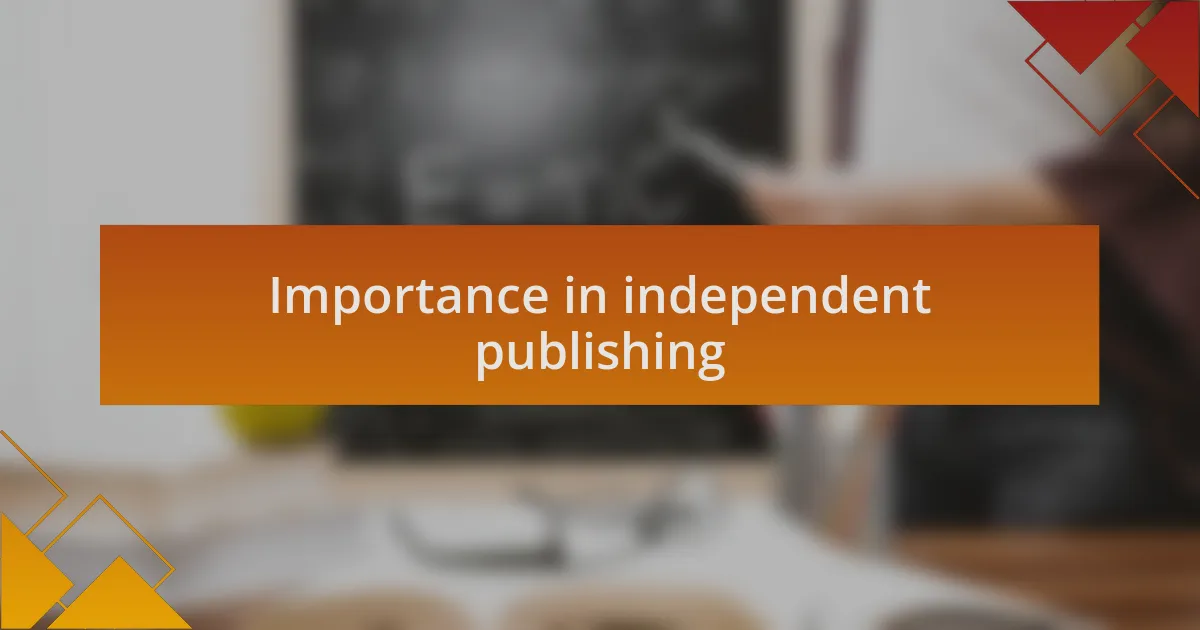
Importance in independent publishing
Having a literary agent can be a game-changer for independent authors. I vividly remember the first time I received an offer from a publisher; my agent’s experience was fundamental in evaluating the terms, helping me understand what was standard and what wasn’t. It’s a daunting world out there, and without an advocate, it’s easy to feel lost. Does the thought of negotiating your rights make your stomach churn? This is where an agent’s support shines.
In the realm of independent publishing, agents often have a network that can open doors to opportunities. I once learned about a niche market for my genre through my agent that I hadn’t considered before. Imagine being able to tap into resources and connections that you didn’t even know existed! This access can elevate your work beyond what you might manage on your own.
Moreover, literary agents can help maintain an author’s brand in a competitive landscape. I found that my agent was instrumental in crafting not just my book’s pitch but also my overall author presence. It made me realize how strategic positioning can influence readers’ perceptions. Have you thought about how your image as an author impacts your writing journey? An agent’s insights can be the difference between being just another book on a shelf and standing out in a crowded market.
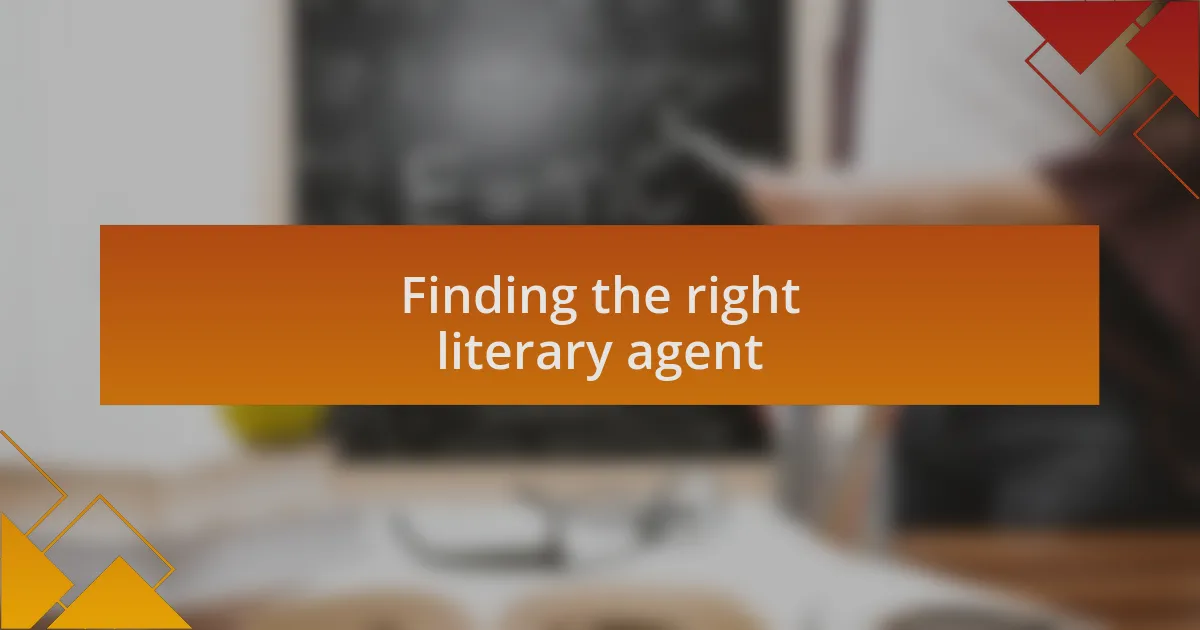
Finding the right literary agent
Finding the right literary agent is like finding a partner in a writing journey. I remember sifting through lists, feeling overwhelmed yet excited. Each agent had their unique style and focus. It wasn’t just about their reputation; it was about how they resonated with my vision. Have you ever felt that instant click with someone when discussing your work? That’s what I looked for—a connection that felt genuine.
I once submitted my manuscript to an agent who specialized in my genre, and it turned into an unexpected collaboration. This agent not only understood my story but also shared my enthusiasm about reaching the right audience. The conversation flowed easily, and our shared passion for the project gave me the confidence to take the next steps. It taught me that the right agent isn’t merely a salesperson; they’re a creative ally who believes in your work.
When searching for an agent, consider their communication style. After a few interactions with potential agents, I quickly realized that responsiveness was key for me. I enjoyed a dialogue where my ideas were welcomed and discussed. Does your potential agent encourage you to voice your thoughts, or do they stifle your creativity? Finding someone who not only listens but also provides thoughtful feedback can make all the difference in shaping your writing career.

Preparing your manuscript for agents
Preparing your manuscript for agents involves more than just proofreading it. When I was getting ready to submit mine, I spent hours refining my pitch letter and ensuring my synopsis was compelling. Have you ever found that polishing your manuscript and watching it transform? Every revision made me feel more connected to my story and more confident in sharing it with others.
Formatting your manuscript according to industry standards can feel dull, but trust me, it matters. I recall how adjusting margins and double-spacing suddenly made my work look so professional—it really changes how agents perceive your seriousness as a writer. It’s the first step in showing that you respect both your work and the agent’s time. Did you know many agents prefer a specific format? Taking that extra minute to research standards can save you from an immediate rejection.
One of the most enlightening moments for me was getting feedback from a writing group before submission. Sharing my work with fellow writers opened my eyes to fresh perspectives. I realized that sometimes, a slight tweak in a sentence could elevate a scene beyond my expectations. Are you open to constructive criticism? Embracing that feedback can be the difference between a good manuscript and a great one, and it’s vital as you prepare to make that important first impression.
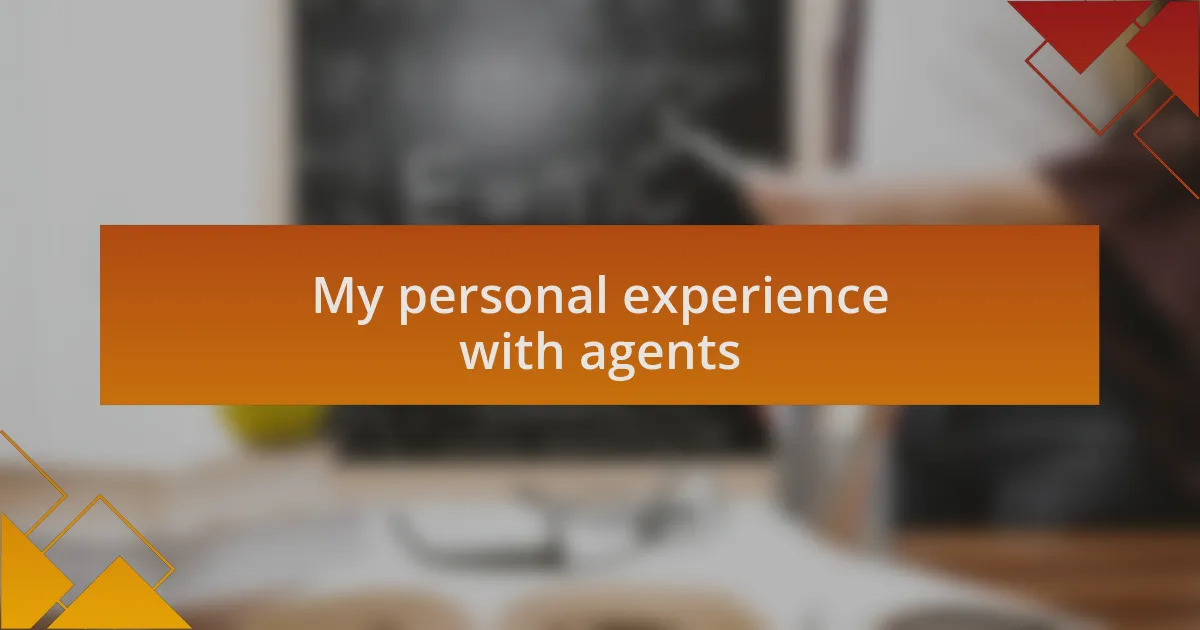
My personal experience with agents
When I finally began querying agents, I was both excited and terrified. I still remember the first time I hit sent on the email—I could almost feel my heart racing. Was my work good enough? I had poured so much of myself into my writing that it felt like I was sending a piece of my soul out into the world. Each response, whether positive or critical, carried so much weight for me.
I encountered a variety of reactions from agents that taught me invaluable lessons about the industry. Some offered encouragement and specific feedback that lit a spark in me, while others sent generic rejection emails that felt like a punch to the gut. It’s fascinating to think about how much individual perspective plays a role in these decisions. Have you ever wondered why one person loves a book and another loathes it? Through this process, I learned to appreciate the subjective nature of literary representation.
The most memorable meeting I had with an agent took place at a local writing conference. I was nervous as I pitched my manuscript during a one-on-one session. To my surprise, she not only showed genuine interest but also posed insightful questions that made me rethink aspects of my story. That interaction not only validated my work but also sparked a deeper understanding of my characters’ motivations. Have you ever experienced a moment that changed your perspective entirely? For me, that was a turning point that reaffirmed my commitment to my craft.
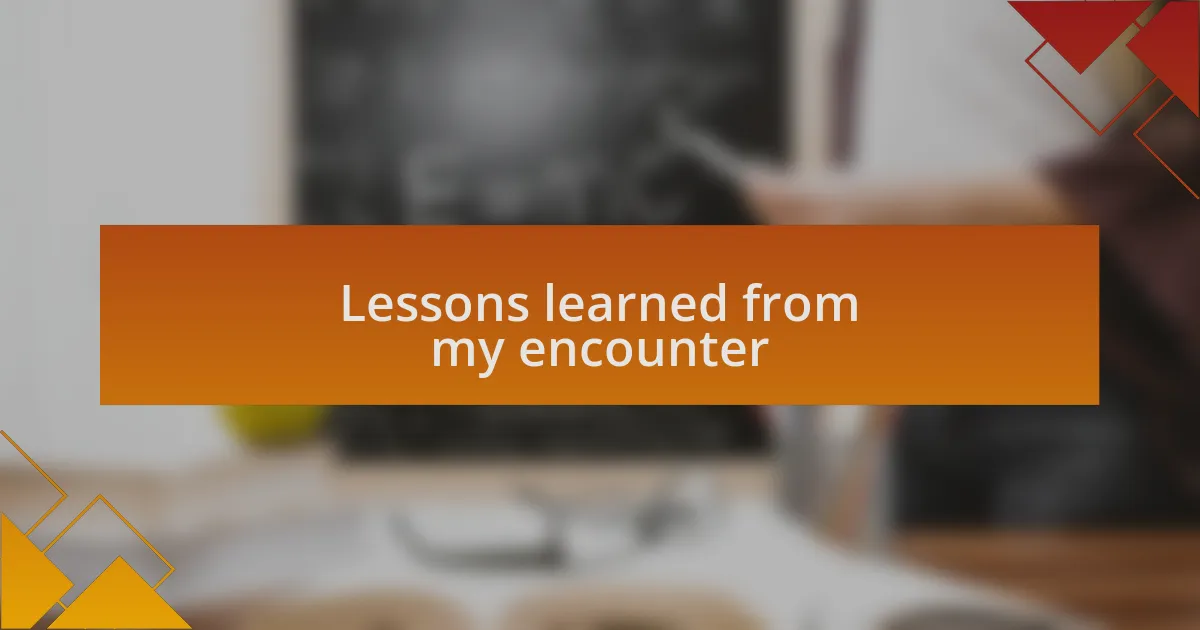
Lessons learned from my encounter
One significant lesson I learned from interacting with literary agents is the importance of resilience. I vividly recall a particularly harsh rejection that left me doubting my abilities. I found myself reflecting on that moment and realized that every rejection was shaping me, pushing me to refine my craft and build a thicker skin. How often do we allow a temporary setback to overshadow our long-term goals? In my case, it became a motivating force that led to revisions and ultimately a stronger manuscript.
Another valuable takeaway was the necessity of being open to constructive criticism. In one instance, I received detailed feedback from an agent who noticed inconsistencies in my plot. At first, I felt defensive; after all, I had believed my story was solid. However, once I revisited those elements with fresh eyes, I uncovered layers in my narrative that I hadn’t explored before. Isn’t it fascinating how outside perspectives can illuminate blind spots we never knew existed? Embracing that kind of feedback has been crucial for my growth as a writer.
Finally, I learned that networking and building relationships are just as vital as the writing itself. During one of my follow-ups with an agent, we discussed not only my manuscript but also our shared interests outside of writing. That casual conversation made me realize that literary agents are people too, and cultivating genuine connections can lead to unexpected opportunities. Have you ever thought about how your passion can resonate with others? I now approach these interactions with a sense of curiosity rather than just a transactional mindset, which has enriched my experience in the publishing world.